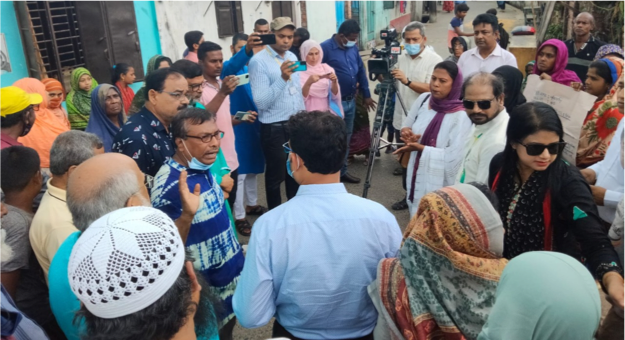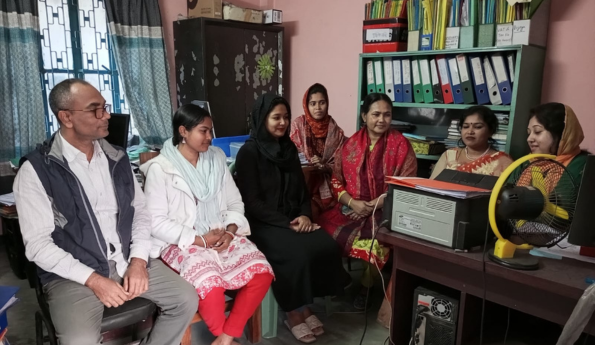Khulna City Corporation is the third largest city in Bangladesh, with an estimated population of 1.77 million. Khulna’s slums have long struggled with the negative impact of unplanned rapid urbanization; more than 60% of households in the slums lack access to basic services including trash removal, drainage, and clean water—issues exacerbated by a lack of funding, lack of awareness of the need, and a lack of coordination between the city government and the communities they serve.
Since 2018, Counterpart—through USAID’s Promoting Advocacy and Rights Activity— has worked with civil society leaders across Bangladesh to strengthen their capacity to define, advocate for, and positively impact lives around specific key issues. Shushilan, a Bengali nonprofit dedicated to supporting the economic and socio-cultural development of the most vulnerable in Bangladesh, works with PAR to advocate for improved quality of life in Khulna.
Improving service provision in wards across Khulna
With support from Counterpart, Shushilan developed a monitoring framework for planned urbanization in Khulna’s poorest neighborhoods. Citizen advocates partnered with Khulna’s mayor and together established a working committee to oversee the implementation of the monitoring framework. The framework monitors service delivery improvements in three priority areas: WASH/access to potable water, waste management, and drainage systems. With close coordination between government representatives, civil society partners, media, the private sector, and community members, the multi-stakeholder committee was the first of its kind in Khulna.

Shushilan hosted a visit at the model ward in Khulna on October 23, 2023, to showcase progress to government representatives and other decision makers.
A testament to the power of collective action, the committee mobilized 83 community groups including 1,300 women and 800 youth to transform slums in wards 5 and 9 and improve the lives of almost 50,000 residents. Following years of effort and improvements, in 2023 the mayor declared city wards 5 and 9 to be “model wards,” or ideal examples of what a ward should offer to its citizens in terms of basic rights and service provision. To achieve this status, wards 5 and 9 had to establish waste collection services, demonstrate repairs to drainage systems to prevent chronic waterlogging, and create two community meeting spaces and a vegetable garden. With support from Counterpart and Shushilan, several other wards are working towards achieving model ward status as well, with two additional wards on track to receive model ward status in the coming months.
Despite this success, government capacity is low, and staffing remains inadequate. When listening to concerns from stakeholders, Shushilan realized that they had to expand their collaboration beyond just the government in order to achieve true impact.
Improving lives through public-private partnerships
In 2022, Shushilan reached out to private water service company PureStream to gauge interest in a collaborative project to help bring potable water to Khulna’s poorest neighborhoods. PureStream is a private sector entity who installs “ATM water booths” throughout Bangladesh to provide a clean water source to local citizens. And while it had built a strong reputation and were already working in Khulna, the company had struggled to expand its offerings due to a lack of collaborative working relationships with the government so the company could identify the best locations for their water ATMs and properly identify communities who would partner with it to maintain the water dispensers. The local community also struggled to embrace PureStream; most residents are day laborers and cannot afford to buy its water.
Following a series of meetings to build trust between the parties, Shushilan hosted a forum to connect the local community with private sector and government stakeholders. At this critical event, the local government representatives agreed to allow PureStream access to the community, and Shushilan and the slum community representatives were able to convince the company to reduce the price of potable water available through the ATMs. Finally, all parties agreed that PureStream would install its water ATMs in the most marginalized communities in Khulna.

Katie Croke, Counterpart’s Chief of Party, with community champions in Khulna inspecting the newly installed water ATM booth.
Shushilan took several steps to ensure that all stakeholders were prepared to be involved in the maintenance of the water dispensers. Community members were organized into “Citizen Rights Protection Committees,” with one committee assigned to each water ATM, and community champions tasked with leading each group. The committees obtained training in leadership and advocacy, technical guidance, and additional support from Shushilan and PAR, which ensured that they were prepared to demand that the city commit to clearing and maintaining the drains so the ATMs could work properly. In June 2023, the local government and PureStream installed the first functional ATM-like machine in ward 9—one of the model wards—that dispenses safe water for nearly 2,000 families living in the Bastuhara Basti slum.
Following the success of the partnership, PureStream asked Shushilan to identify additional locations to install the water machines in low-income neighborhoods across the city. According to Nurun Nobi, Sushilan project coordinator, “PAR’s contribution [to establishing this successful public-private partnership model] has been enormous.”
Hope for the Future
With the success of Shushilan’s monitoring framework in the model wards, including the water ATMs, Khulna’s mayor has pledged to explore opportunities to replicate efforts across the city’s remaining wards. As he shared, “witnessing the communities in model wards 5 and 9 flourish has filled me with hope for Khulna’s future.”
The story was covered by the media, which spurred even more public support for the initiative. Shushilan’s advocacy resulted in significant media coverage over the past two years. The Daily Purbanchol, Khulna’s leading daily newspaper, published a front-page article on how Shushilan’s community network transformed a dumping zone in the Dattabari slum into a beautiful vegetable garden. After reading the story, a prominent national electronic media outlet interviewed Shushilan’s executive director, who highlighted Counterpart’s community-led efforts to collaborate with civil society and government officials, and how public-private cross-sectoral partnerships are bringing potable water to the most vulnerable of Khulna’s residents.
With 17 water ATMs installed, providing potable water to the most marginalized communities in Khulna, Shushilan and PureStream are making plans for the future. The goal: install 250 water access points, in partnership with the government, and ensure affordable, accessible, clean drinking water for all residents in Khulna City.





